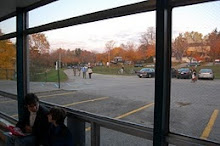Someone happened upon my blog by searching for info on CO2. They arrived on a page with an off-topic comment from last summer on climate change. The commenter says CO2 emissions are not a threat because pure CO2 is denser than air, which is made up of nitrogen, oxygen, and CO2. It’s true that CO2 is denser than air. CO2 is one of the components of air, and CO2 emissions rapidly mix in with air, adding to the percentage of CO2 comprising air. The commenter wrongly thought that CO2 emissions would go “into the ground” because of the density of pure CO2.
I never responded to this wishful notion partly because I share the same wish. Most of the huge increase in GDP the world has seen in the last two centuries and the huge increase in population that came with it has been made possible by energy from burning things. The price of this energy is climate change: temperatures rising faster than they would have without human activities. It’s very hard to calculate how much this will cost in the future versus the benefit we get to today. All we know is the thing that makes our way of life possible will make us pay a price in the future. The magnitude and uncertainty of the threat is so unnerving that it’s tempting to fall into wishful thinking.
I’m not keen to shatter people’s comforting fantasies, but when I saw someone come to my blog looking for information I realized I ought to shatter this one.
Human activities are changing the environment in ways that will certainly be costly to future generations. There is no magic trick that will make the problem disappear. Solving this problem will be as hard as finding a way to the moon and back before modern computers or as hard as winning WWII, things that look easier in retrospect than they did going into them. We must do our utmost to minimize anthropogenic climate change (i.e. control emissions and deforestation), prepare to deal with the repercussions of climate change, and work on technologies that might be able to reverse or control climate change.
Wednesday, September 30, 2009
Monday, September 21, 2009
Not All Slack Is Due to the Economic Cycle
An article in the WSJ today deals with the relationship between excess production capacity (slack) and inflation: Slack Attack: Fed Faces Test on Inflation. It examines whether the evidence slack in our economy will protect us from inflation.
I suspect inflation is more likely than people realize. We haven’t had it for a few decades, so it seems like we never will have a problem with it.
I wonder if economists have a way to differentiate the effects of macroeconomic factors from cultural changes in what people are demanding. For example, the factory in this article that makes doors isn’t producing nearly at its full capacity. Is that a sign that the Fed should inject more money into the economy, or might it be that ten years ago new doors were a popular product but now people want some other product or service?
When I read about sales of manufactured goods being down, I wonder if they might be being replaced by things totally unrelated. Maybe people feel like they have enough cars big-screen TVs in their lives, for example, and now they want to spend their money on $5-a-cup fair-trade coffee. (This is certainly true for my enclave on the near west side of Madison, WI.)
I feel sorry for the town of Bend, OR suffering from massive layoffs at its door and window factory. I question how much of that effect is due to the economic cycle and how much of it is certain types products and services falling into and out of fashion over time.
We should be very cautious about our loose monetary and fiscal policy. Once inflation comes back, it will be hard to get rid of.
I suspect inflation is more likely than people realize. We haven’t had it for a few decades, so it seems like we never will have a problem with it.
I wonder if economists have a way to differentiate the effects of macroeconomic factors from cultural changes in what people are demanding. For example, the factory in this article that makes doors isn’t producing nearly at its full capacity. Is that a sign that the Fed should inject more money into the economy, or might it be that ten years ago new doors were a popular product but now people want some other product or service?
When I read about sales of manufactured goods being down, I wonder if they might be being replaced by things totally unrelated. Maybe people feel like they have enough cars big-screen TVs in their lives, for example, and now they want to spend their money on $5-a-cup fair-trade coffee. (This is certainly true for my enclave on the near west side of Madison, WI.)
I feel sorry for the town of Bend, OR suffering from massive layoffs at its door and window factory. I question how much of that effect is due to the economic cycle and how much of it is certain types products and services falling into and out of fashion over time.
We should be very cautious about our loose monetary and fiscal policy. Once inflation comes back, it will be hard to get rid of.
Subscribe to:
Posts (Atom)

